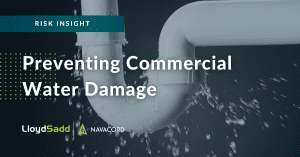Preventing Commercial Water Damage

Water damage consistently ranks as one of the most common reasons for insurance claims among businesses. This damage is not just expensive; it can also create potential health risks and bring the productivity of businesses to a halt, costing additional time and money. Fortunately, various low-cost preventive measures can help reduce the threat of water damage. Consider the following tips:
- Maintain heating, ventilating and air conditioning (HVAC) systems. HVAC systems are necessary for maintaining a comfortable work environment but can cause costly water damage when not maintained. As such, include HVAC systems in building maintenance programs to check that condensation collection pans, drains and condensation pumps are functioning properly.
- Conduct regular roof inspections. Roof leaks can lead to rot and mould growth and can damage surfaces inside buildings. Visually inspect roofs to verify draining systems are clear of debris and functioning as expected. Furthermore, arrange assessments with professional roofing maintenance providers to ensure that small deficiencies don’t become more serious problems.
- Prevent freeze-ups. During severe cold spells, sprinkler systems and water pipes can freeze, burst and cause devastating water damage. Identify all equipment, processes and piping that could be susceptible to freezing and add sufficient insulation. Drain and secure idle equipment, protect remaining equipment with suitable anti-freeze products and consider locating equipment in heated enclosures.
- Inspect sewage lines. Excess water created from sewer blockages can force sewage into buildings through floor drains, toilets and sinks. Consider asking a professional to inspect sewage lines regularly to facilitate early detection of blockages.
- Check water heaters. When water heaters fail, they release water and can cause significant property damage. Additionally, deposits accumulate on the bottom of water heater tanks and corrode tank liners over time. As such, regularly inspect water heaters for signs of failure and replace units every 10 years. Furthermore, automatic shut-off valves are a great way to limit damage in the event of a leak or unit failure.
Consider implementing a water damage prevention and response plan to prepare for all eventualities and limit potential losses.
To download the insight, click here: Risk_Insight_Preventing Commercial Water Damage